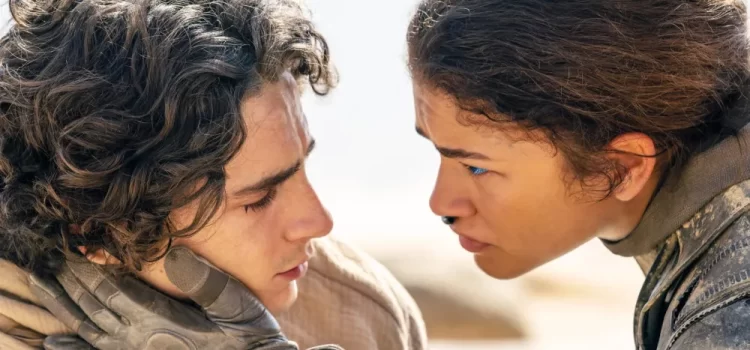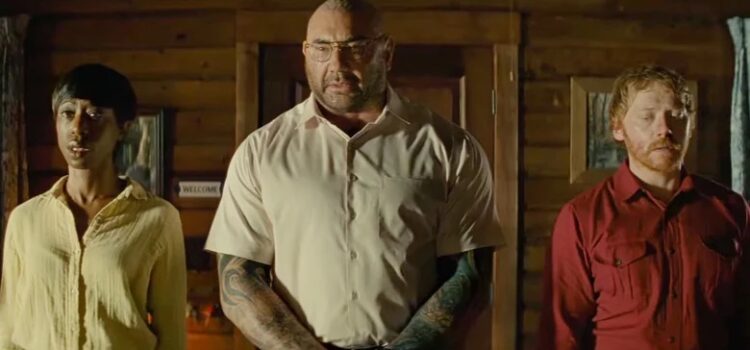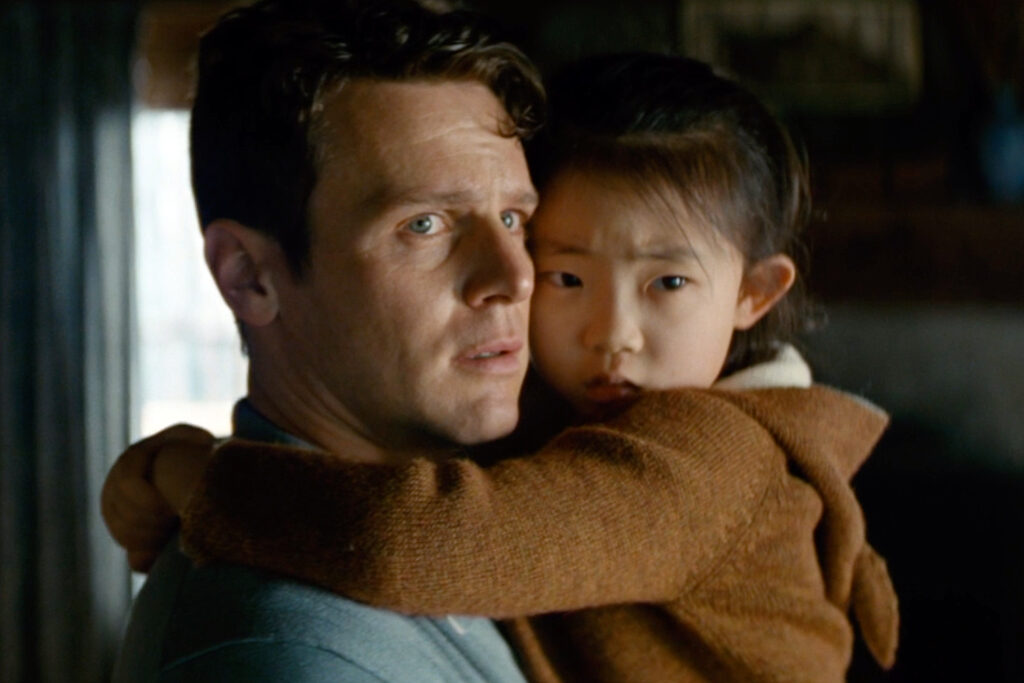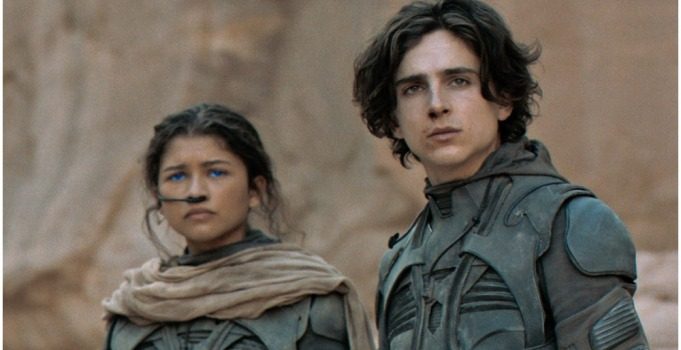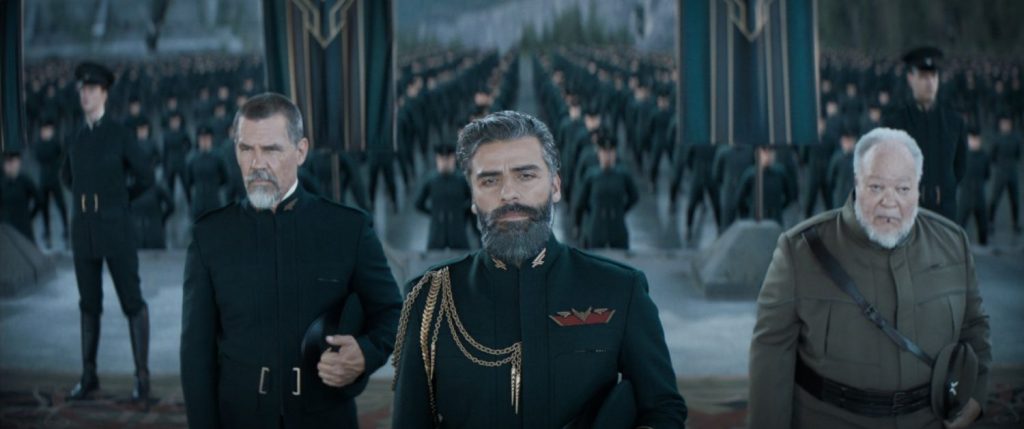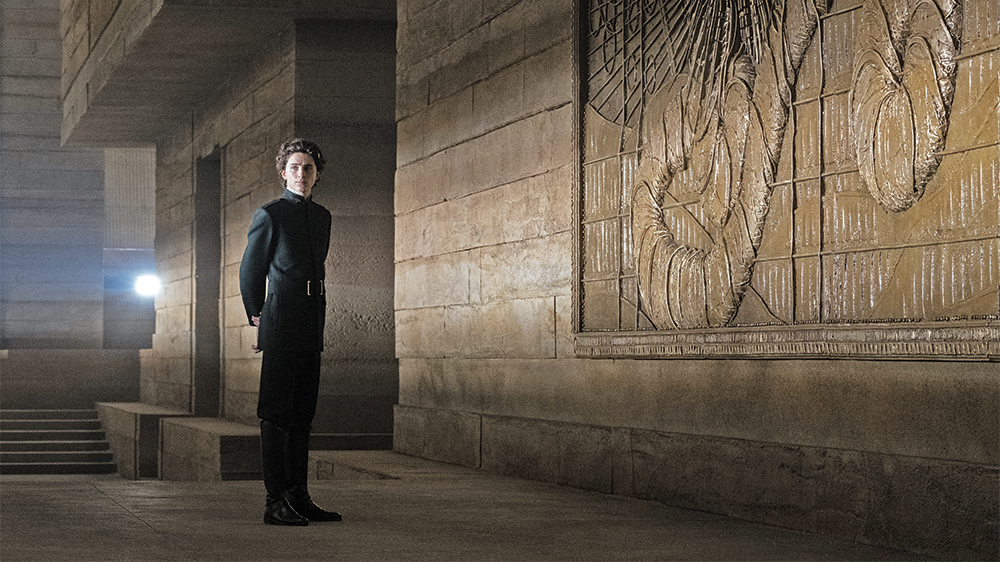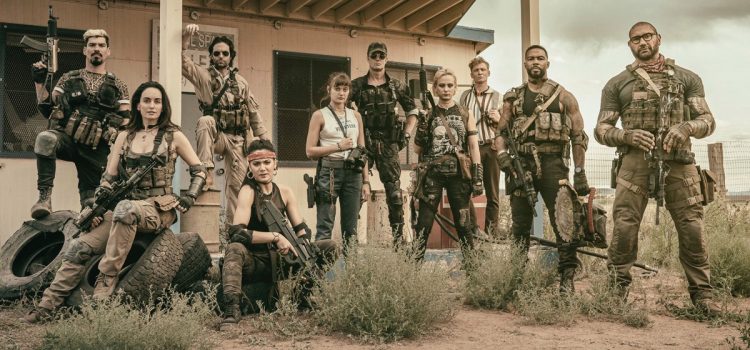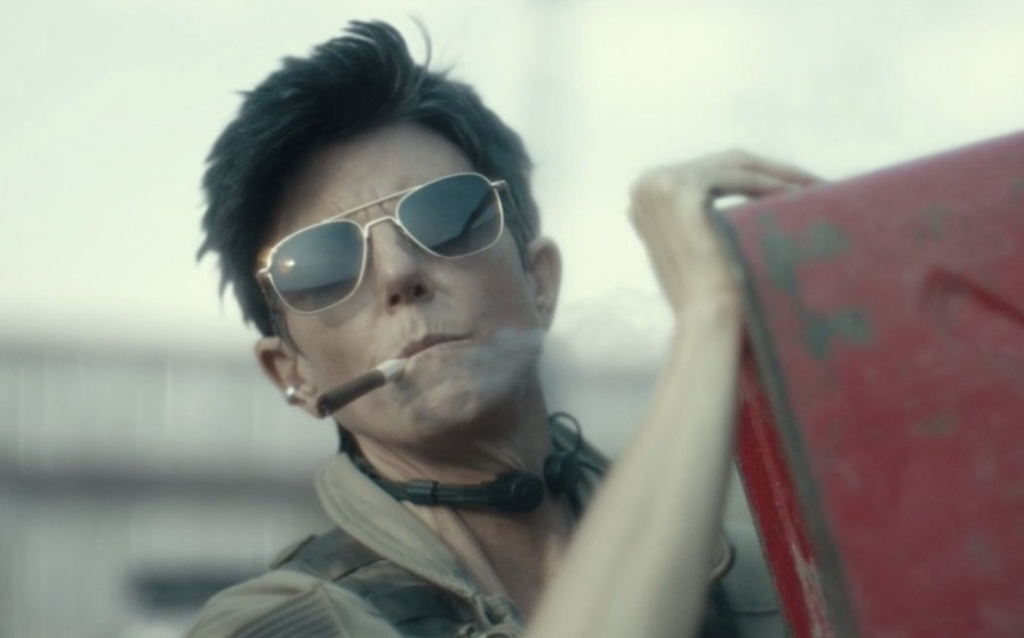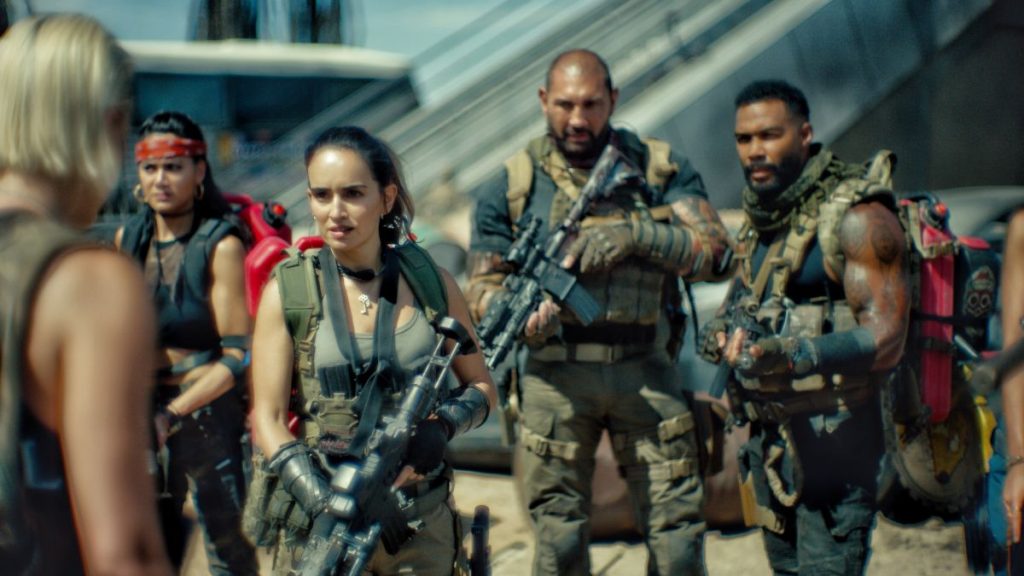By Lynn Venhaus
A masterful melding of massive spectacle, heartfelt high-stakes performances, and astonishing visual artistry, “Dune: Part Two” expands the mythic hero’s journey to its full potential.
After the global embrace of “Dune” in 2021 as a stunning adaptation of Frank Herbert’s 1965 book, considered the best-selling science fiction novel of all-time, the sequel has been highly anticipated to complete the first book on screen.
Part Two chronicles the novel’s second half, which follows a feudal interstellar society in a galaxy far, far away. At this time, while seeking revenge against the conspirators who destroyed his family, Paul Atreides (Timothee Chalamet) unites with Chani (Zendaya) and other Fremen. Forced to make either a personal choice or save the fate of the known universe, he endeavors to prevent a terrible future only he can foresee.
While it’s more riveting because of the whole picture, there could always be further character development due to its gigantic scope – nevertheless, the entire arc’s lucidity is much improved here.
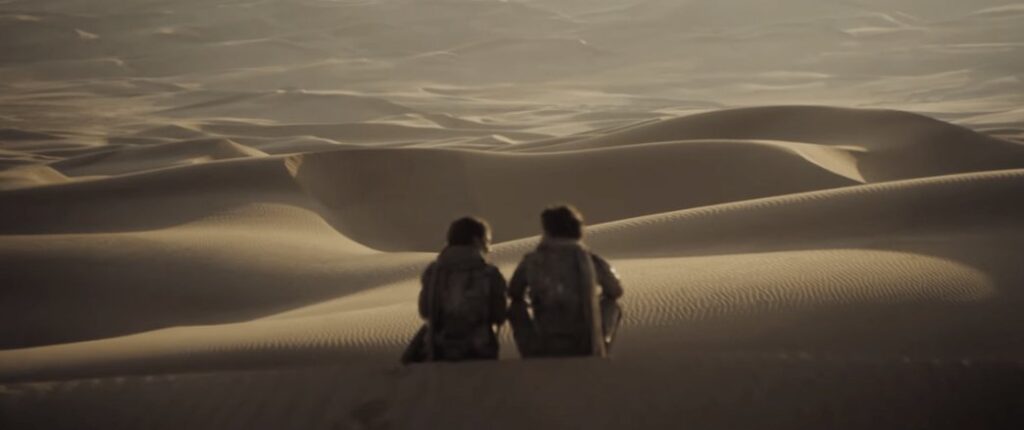
In the first’s attempt at world-building, the narrative was largely unwieldy. However, no one could deny its mesmerizing grand-scale wizardry. (A second viewing really helped sort out the planets and houses).
Now that we are familiar with the desert wasteland Arrakis, the risks between the warring dynasties are made clearer. That is, for those of us who didn’t read Herbert’s first novel (or the other five in the “Dune” series).
‘Spice,’ the most precious resource in this universe’s existence, spurs the malevolent forces who want to control its extraction in Arrakis, because it is necessary for space navigation and its multidimensional awareness and foresight properties.
By picking up where the first left off, this second part effectively ties up loose ends, and deepens what is at stake. The focus narrows on young Paul Atreides, who must grow from an unseasoned boy, without his royal father to guide him, into the man he needs to become. Sacrifices must be made, and he continues to manifest his future in visions/dreams.
The religious and political implications of whether he is fulfilling a prophecy is what makes for propulsive viewing. The screenplay, co-written by director Denis Villeneuve and Jon Spaihts, contains requisite bombastic and brutal confrontations, but also includes sincere intimate moments that give the film its beating heart.
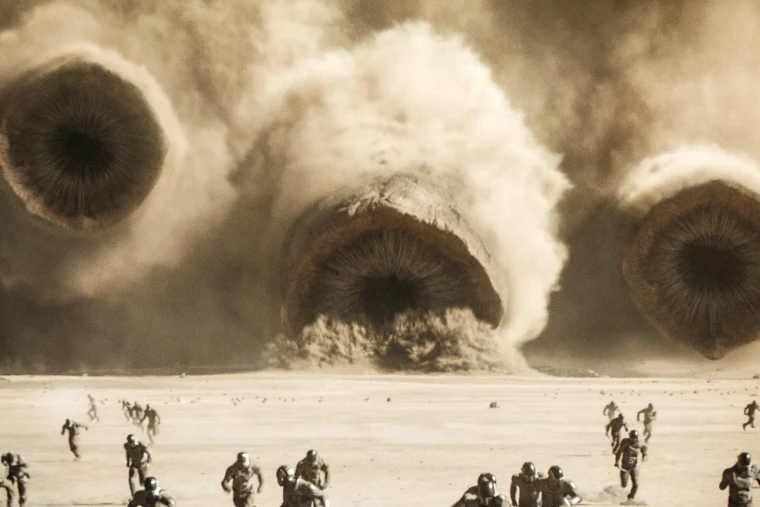
To that end, all the actors in this finely-tuned sprawling ensemble bring their A game, but Chalamet discernibly takes the reins – and without question, has come into his own as Paul.
It’s an emotionally charged turn, as he conveys a range of feelings, tormented by the burden of expectations and the challenge of learning ways to survive, especially conquering fear. As he notably rises above the pressures, his brooding Paul summons a strength that is exhilarating to watch.
Chalamet is fully invested as the gifted heir of the noble house of Atreides, who saw nearly everyone he cared about massacred. As the Harkonnen sharpen their attacks, Paul, who escaped Caladan with his mother to find refuge in Arrakis, is aided by the Fremen so that his people, and his family, have a future.
Whereas in the first, he was a blank slate “to the manor born,” and being groomed to take over. He accepted his duties, although reluctantly. But now, it’s urgent that he ascend into this pre-ordained role, and the question looms about his readiness. So far, he’s demonstrated heroic bravery and fierce loyalty, and must believably transform to meet the moment.
Now called “Usul,” or “Muad’Dib,” the Fremen respond to him with reverence – if they believe he is their savior. There are skeptics, though.
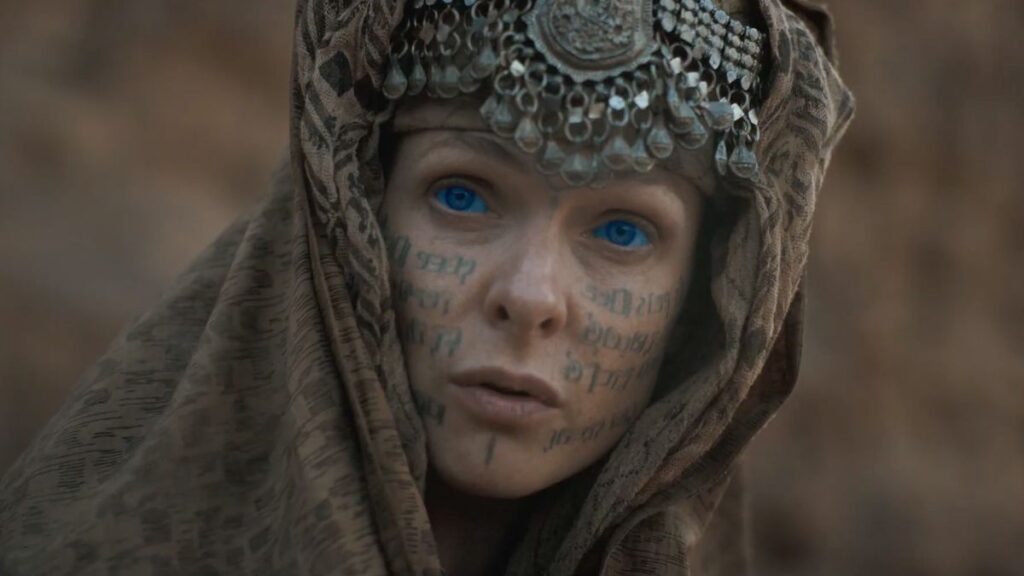
His mother, Lady Jessica (Rebecca Ferguson), becomes a Reverend Mother, and has a more fully developed role, steering her son towards his destiny and acting mysteriously as she prepares for the birth of her second child, a daughter. Ferguson is shrewdly alert and misses nothing as Leto’s widow.
Zendaya is more prominent as well, as Chani, a devoted and fearless Fremen warrior. Paul, a nobleman, is everything she has previously despised, but admiring his derring-do, they fall in love. That, of course, is complicated, and the two become a dynamic duo. Now bona fide movie stars, the camera loves both actors.
Also given more heft is venerable Javier Bardem as the courageous and wise Stilgar, who becomes a mentor and protector of Paul, fully believing that he is the next Messiah “as written.”
In a spellbinding scene pitting man against “a grandfather” sandworm that is one of cinema’s most astounding ever, Paul wins over a majority of Fremen. This is the money shot folks will be talking about for a long while.
Bardem is terrific, and so is Josh Brolin, who returns as brawny Gurney Halleck, the war master of the House of Atreides, who is one of Paul’s trusted advisors. Noteworthy, too, is Souheila Yacoub as Shishakli, a powerful Fremen sandrider.
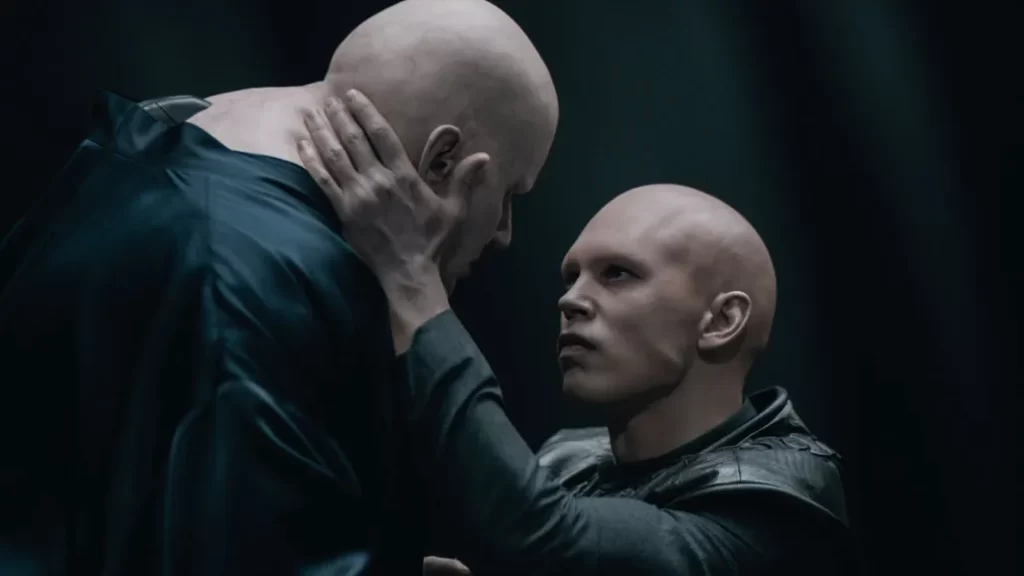
On the dark side, a hulking, menacing Dave Bautista rages as Beast Rabban, part of the ruthless Harkonnen House, never to be trusted, and Stellan Skarsgard is a slimy and treacherous baron, a grotesque cross between Jabba the Hut and Palpatine in the “Star Wars” universe.
New to the story is a mind-blowing Austin Butler as the diabolical Feyd-Rautha, the baron’s cruel nephew and heir apparent. A cunning psychopath, the na-baron is imposing physically, and Butler’s transformation is startling. He proves that he is no one-trick pony after his breakthrough Oscar-nominated role as Elvis in Baz Luhrmann’s biopic last year.
Another new wrinkle is Florence Pugh as savvy Princess Irulen, daughter of the scheming emperor, smartly played by Christopher Walken. Pugh is properly regal, and while she only has one scene with her “Little Women” suitor Chalamet, it’s a showcase for all – the battle royale.
The cast serves the complexities of the characters well, we care more about their fates, and while the uninitiated might not understand all the elements at play, this trajectory is much smoother with this second helping.
Villeneuve establishes himself as a true visionary here – while I’ve enjoyed many of his films (“Blade Runner 2049,” “Arrival,” “Sicario” among them), and he is a meticulous craftsman, this is the first time I understood his fully realized end game, how the storytelling rose to the level of the visual effects.
If “Oppenheimer” is Christopher Nolan’s magnum opus, then “Dune: Part Two” is Villeneuve’s. What is impressive about both directors is their desire to create cinematic experiences, films that demand big-screen viewings because they fill the screen with wonder.
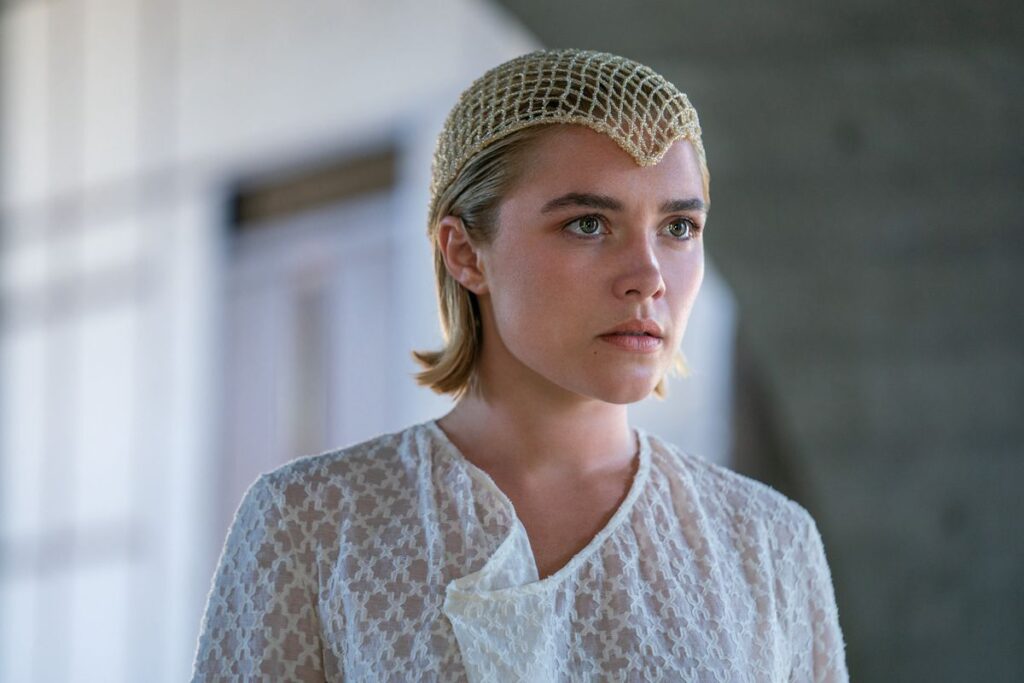
It was also smart to delay the sequel’s release date from November because it becomes the first welcome and sorely needed blockbuster of 2024. Mark my words, if “Dune: Part One” won six Oscars two years ago (original score, sound, film editing, cinematography, production design and visual effects), clear the trophy case for this latest during next year’s awards season.
The mythology’s epic scale is presented in a next-level, state-of-the-art artisanal way. Oscar winner Greig Fraser’s cinematography again dazzles with his panoramic planetary landcapes, scary sandworm eruptions, and grisly gladiator confrontations.
Production designer Patrice Vermette has created eye-popping worlds distinguishing each planet and house. Hans Zimmer’s stirring music effectively underscores the action and enhances the moods.
The first film was 2 hours and 35 minutes, and this follow-up adds 11 minutes, but didn’t detract. It certainly sets up an eager anticipation for “Dune: Part 3,” which is supposedly in the works, and will be based on the second novel, “Dune: Messiah.”
Villeneuve’s “Dune” series is the most successful to date for the devoted fan base. Filmmaker Alejandro Jodorowsky attempted a film adaptation in the 1970s but was cancelled after three years in development. Then David Lynch made a complex adaptation in 1984, which was not well-received, although fans were receptive to a Sci-Fi Channel miniseries in 2000.
With its breath-taking and jaw-dropping visuals and big-stakes bravado, “Dune: Part 2” is an enthralling cinematic marvel that we can both admire and enjoy.
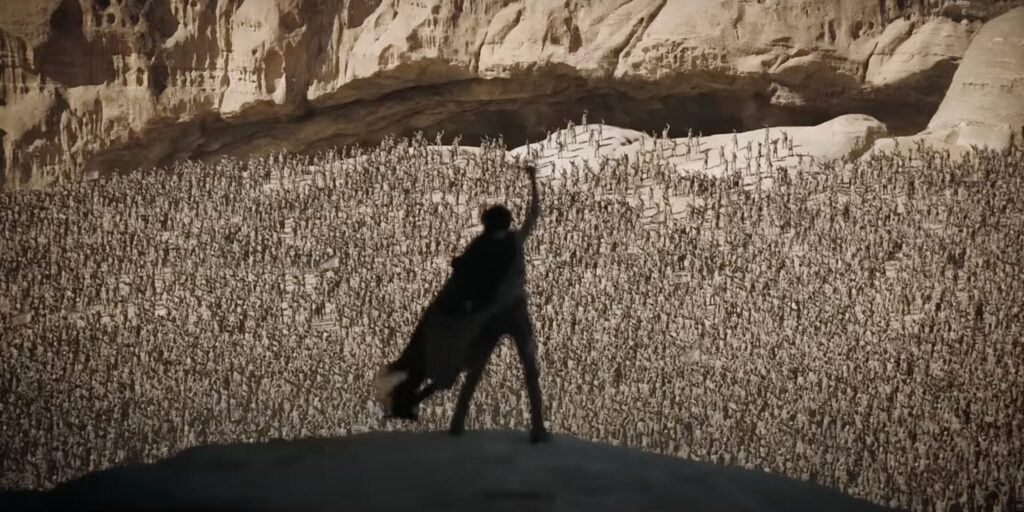
“Dune: Part Two” is a 2024 science fiction action-adventure directed by Denis Villeneuve and starring Timothee Chalamet, Zendaya, Rebecca Ferguson, Austin Butler, Javier Bardem, Josh Brolin, Florence Pugh, Christopher Walken, Dave Bautista, Stellan Skarsgard and Charlotte Rampling. It is rated PG-13 for sequences of strong violence, some suggestive material and brief strong language, and its runtime is 2 hours, 46 minutes. It opens in theatres March 1. Lynn’s Grade: A.
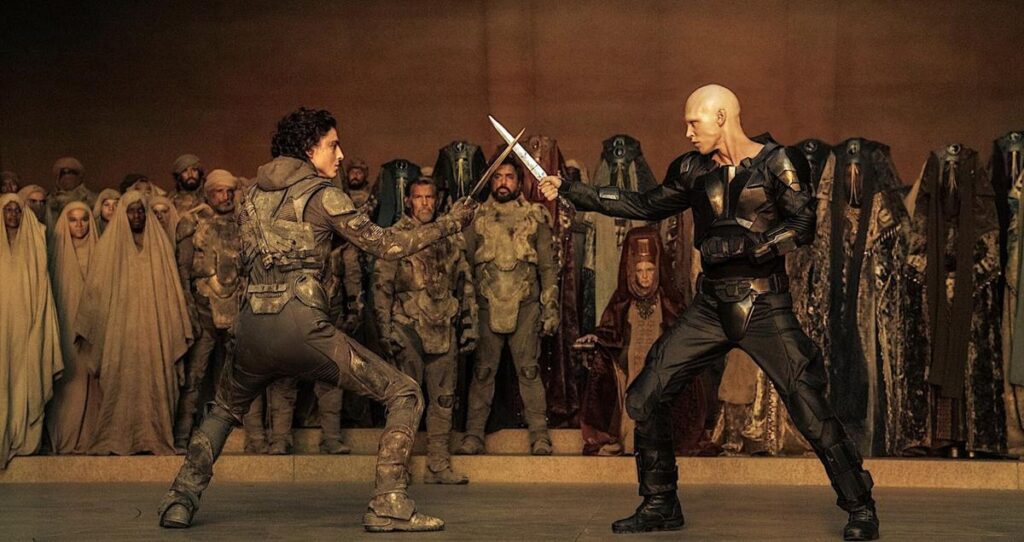

Lynn (Zipfel) Venhaus has had a continuous byline in St. Louis metro region publications since 1978. She writes features and news for Belleville News-Democrat and contributes to St. Louis magazine and other publications.
She is a Rotten Tomatoes-approved film critic, currently reviews films for Webster-Kirkwood Times and KTRS Radio, covers entertainment for PopLifeSTL.com and co-hosts podcast PopLifeSTL.com…Presents.
She is a member of Critics Choice Association, where she serves on the women’s and marketing committees; Alliance of Women Film Journalists; and on the board of the St. Louis Film Critics Association. She is a founding and board member of the St. Louis Theater Circle.
She is retired from teaching journalism/media as an adjunct college instructor.

